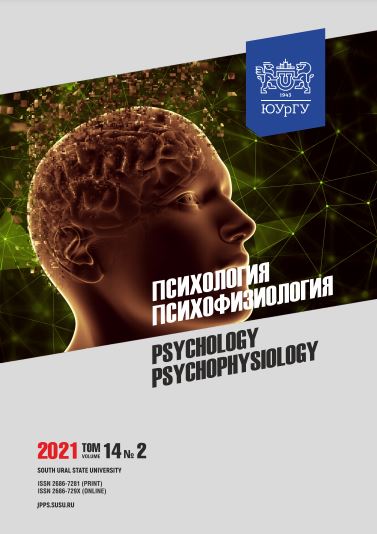PSYCHOLOGICAL FEATURES OF STUDENTS PERSONALITY DEVELOPMENT AS A PREDICTOR OF THEIR PREADAPTATION TO THE PROFESSIONAL FUTURE
Abstract
Abstract. The article deals with the features of personal development of students of higher educational institutions as an adaptive resource of professional realization in the future. Objective: to study the specifics of the development of personal characteristics of university graduate students as the basis of their psychological readiness and predictor of preadaptation to a professional future. Materials and methods. The study involved 120 university students aged 21 to 24 years, who were divided into two samples of subjects. the experimental group consisted of 60 graduate students of the faculty of psychology and philology of the Kuibyshev branch of the Novosibirsk State Pedagogical University and a control group of 60 graduate students of the faculty of informatics and computer engineering of the novosibirsk state technical university. During the study used the following methods: “research Technique of self S.R. Panteleeva” (MIS); Test “Semantically-life orientation” (procedure DLC) D.A. Leontiev; “Methods of studying of motivation of professional activity” C. Zamfir in modification by A. Rean. Methods of descriptive statistics were used to process empirical data, and the Student's t-test for independent samples was used as a method of mathematical statistics. Results. Peculiarities of the personal development of graduates of pedagogical universities, which are characterized by conflicting self; a tendency to self-blame; disbelief in the ability to control the events of his own life (scale of “Locus of control – I”); dissatisfaction with the outcome of past part of life; the predominance of external motivation of educational and professional activities in combination with the need for development and improvement of one's own personality. The personal profile of students of a technical university is more balanced, but it is also characterized by inconsistency and the predominance of external motivation for educational and professional activities. Conclusion. In the modern post-industrial, information society, personal characteristics serve as a qualification characteristic of a professional and require purposeful development at all stages of professional training. in this connection, it is necessary to restructure the methodology of professional education of higher education, aimed at the personal development of the student.
Downloads
References
2. Verbitsky A.A., Ilyazova M.D. Invariants of professionalism. Problems of formation. Monograph. Moscow: Logos, 2011: 288. (in Russ.). https://elibrary.ru/item.asp?id=20243412
3. Zeer E.F. The youths professional future prognostication psychological features. Aktualnye problemy psikhologicheskogo znaniya= Actual problems of psychological knowledge. 2015; 3 (36): 16–26. (in Russ.). https://elibrary.ru/item.asp?id=24339013
4. Zeer E.F., Symanyuk E.E. Assymetric professional future of modern youth. Pedagogicheskoe obrazovanie v Rossii = Pedagogical Education in Russia. 2013; 4: 258–263. (in Russ.). https://elibrary.ru/item.asp?id=20365204
5. Zeer E.F., Symanyuk E.E. Theoretical and applied bases of forecasting the future of professional person. Fundamentalnye issledovaniya = Fundamental research. 2014; 9-8: 1863–1869. (in Russ.). https://elibrary.ru/item.asp?id=22417032
6. Salovey P., Stroud L.R., Woolery A., Epel E.S. Perceived emotional intelligence, stress reactivity, and symptom reports: Further explorations using the trait metamood scale. Psychology & Health. 2002; 17 (5): 611–627. (in Russ.). DOI: 10.1080/08870440290025812
7. Chulanova O.L., Ivonina A.I. Formation of soft skils: approaches to integrating russian and forein experience, classification, operationalization. Upravlenie personalom i intellektualnymi resursami v Rossii = Human Resources and Intellectual Resources Management in Russia. 2017; 6 (1): 53–58. (in Russ.). DOI: 10.12737/24692
8. Abulkhanova K.A. Psychology and consciousness of personality. Moscow. MODEK. 2004: 224. (in Russ.). https://elibrary.ru/item.asp?id=20086841
9. Gilleard J., Gilleard J.D. Developing Cross-Cultural Communication Skills. Journal of professional issues in engineering education and practice. 2002; 128 (4): 187-200 DOI: 10.1061/(ASCE)1052-3928(2002)128:4(187)
10. Bolshedvorskaya M.V. Research of the modern students the conceptual reality. Pedagogicheskii imidzh = Pedagogical image. 2018; 1 (38): 194–206. (in Russ.). https://elibrary.ru/item.asp?id=32816205
11. Zeer E.F. Panorama of main directions of development of a leading professional education. Professionalnoe obrazovanie i rynok truda = Vocational education and the labor market. 2019; 2: 5–8. (in Russ.). DOI: 10.24411/2307-4264-2019-10204
References on translit
-Copyright (c) 2021 Psychology. Psychophysiology

This work is licensed under a Creative Commons Attribution-NonCommercial-NoDerivatives 4.0 International License.



